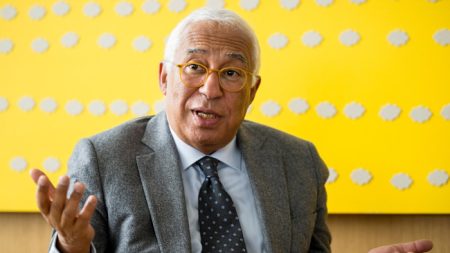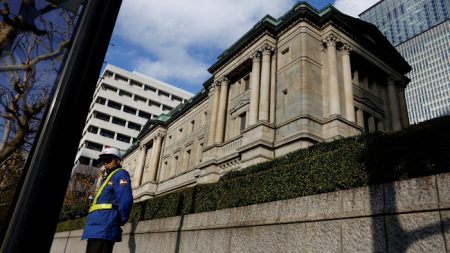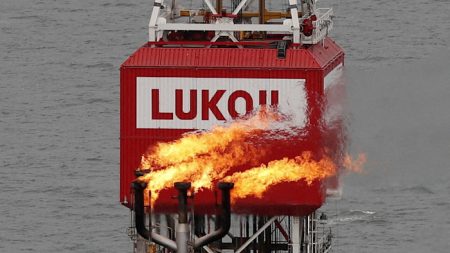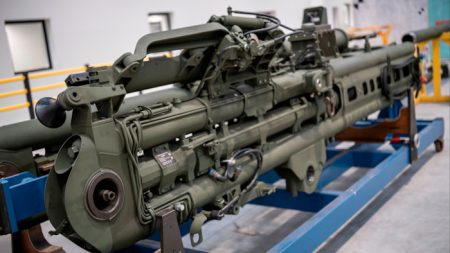Unlock the Editor’s Digest for free
Roula Khalaf, Editor of the FT, selects her favourite stories in this weekly newsletter.
The US and France were racing on Wednesday to secure a truce between Israel and Hizbollah as Israel’s military chief told troops to prepare for a potential ground offensive in Lebanon.
US President Joe Biden and his French counterpart Emmanuel Macron met on the sidelines of the UN general assembly in New York to discuss efforts to secure a ceasefire between Israel and Lebanese Hizbollah and prevent a wider war.
The two leaders were aiming for a 21-day ceasefire, during which mediators would work on a longer-term agreement, according to two people briefed on the situation.
The halt to the escalating conflict would be used to work towards fully implementing a UN resolution reached in 2006 to end a previous conflict between Israel and the Iran-backed militants, which calls for changes including the demilitarisation of southern Lebanon along the Israeli border, the person said.
French president Macron said on Wednesday there “must not be war in Lebanon”, adding that he was dispatching foreign minister Jean-Noel Barrot to Beirut at the end of the week as part of the effort to avert an all-out war.
Biden said he was “using every bit of energy I have” to try to halt the fighting in the hope that a “ceasefire in Lebanon” could pave the way to “dealing with the [occupied] West Bank” and Gaza.
Biden said Arab nations in the region were “willing to make arrangements with Israel and alliances if Israel changes some policies”.
However, a western diplomat in the region said there was scepticism about the initiative.
The conditions that have led to a stalemate in the hostage-for-ceasefire talks over Gaza still exist, so “why would you think you can push Israel and Hamas to accept one now. What changed?” the diplomat said.
“[Benjamin] Netanyahu will never agree to linking the two fronts,” the diplomat argued, saying this was exactly what Hizbollah and its main backer, Iran, “had been attempting to do for 12 months”.
“Hizbollah is very slowly and carefully calculating every next move. They were hit very bad but they are not defeated,” the diplomat added.
The diplomatic drive came as the Israel Defense Forces’ chief of staff Lieutenant General Herzi Halevi told troops that air strikes on Lebanon were not just aimed at “degrading” the Lebanese militant group but “to prepare the ground for your possible entry” in what would be Israel’s first invasion of the country since the two sides fought a 34-day war in 2006.
“We are preparing the process of a manoeuvre, which means your military boots, your manoeuvring boots, will enter enemy territory, enter villages that Hizbollah has prepared as large military outposts,” he said.
The speech was Israel’s most explicit threat of a ground offensive since it began an intense bombardment of Lebanon from the air three days ago, striking thousands of targets it said were linked to Hizbollah, while killing hundreds of people and adding to fears of all-out war.
US Pentagon spokesperson Sabrina Singh said on Wednesday that “in terms of a ground incursion . . . it doesn’t look like something is imminent”.
But the IDF said it was calling up two reserve brigades, which would “enable the continuation of combat” against Hizbollah to defend Israeli territory and allow residents of northern Israel displaced by the cross-border conflict — which has been simmering since Hamas’s attack on the Jewish state last October — to return home.
However, Israel has yet to mobilise military reservists on the scale that it did when it launched its offensive against Hamas in Gaza 11 months ago.
Netanyahu, Israel’s prime minister, insisted on Wednesday the military operation would continue. “I can’t go into detail about everything we do, but I can tell you one thing: We are determined to return our residents in the north safely to their homes,” he said in a short video.
Israeli air strikes have killed more than 600 people this week, including 72 on Wednesday, according to Lebanese authorities. The International Organization for Migration said at least 90,000 people in Lebanon had been displaced by the violence.
Early on Wednesday, sirens sounded in Tel Aviv as Hizbollah fired a ballistic missile at Israel for the first time.
Hizbollah said the Qader 1 ballistic missile, more destructive and with a longer range than other rockets the group had fired in the conflict, targeted the headquarters of Israeli intelligence agency Mossad on the outskirts of Tel Aviv.

Though intercepted by Israel’s air defences with no damage or injuries reported, the launch marked one of the group’s deepest strike attempts and its first aimed at the country’s economic hub.
Hizbollah also revealed it used “Fadi” rockets this week for the first time. The rockets have a range of 70km to 100km — longer than others used by the group.
Israel has been bracing for more intense Hizbollah fire after the IDF began heavy raids on the group’s strongholds on Monday.
On Wednesday, Israeli air strikes pummelled Lebanon with renewed ferocity, expanding the campaign to new regions of the country outside Hizbollah-dominated areas. They have triggered an exodus of residents from southern Lebanon as panicked families fled to safer areas.
Hizbollah’s barrages have increased in response to the Israeli strikes, and the group has fired deeper into Israel. Most of its projectiles have been intercepted by Israel’s air defences, but the group is thought to have large unused stockpiles.
Additional reporting by Charles Clover. Data visualisation by Steven Bernard and Chris Cook
Read the full article here














